They insist they're Harijans, or children of god, and reject the nomenclature of Dalit post-Independence India has coined for its teeming untouchables. Quiet, shy and seemingly content with what they have, they confine themselves to the colonies they have been living in for over a century, when the British administrators brought their ancestors from Uttar Pradesh.
And no one had really noticed them until the Harijans held their first national conference in Dhaka on September 15. Organised to highlight their various demands such as better education and medical facilities, the conference not only articulated the simmering discontent in the community but also revealed the staggering number of Harijans residing in Bangladesh - an incredible one million.
"We didn't have many complaints before as we weren't expected to do anything else except sweeping and drinking," says Ram Kumar Das, 23, who lives with his extended family in Miranjilla, the country's biggest sweeper colony in old Dhaka with over 5,000 people. He works as a cleaner at the Dhaka City Corporation, the job he inherited automatically after his father retired five years ago. It was precisely this job security (and free housing and medical facilities) that kept the community content - and quiet.
But declining employment has persuaded many others to vie for the 'dirty jobs' once considered demeaning. The ensuing competition has rendered the Harijans of Bangladesh insecure. In fact, Harijans now make just 40 per cent of the 5,000 permanent sweepers employed at the Dhaka City Corporation. Worse, this number is dwindling. "We thought we could no longer keep quiet as this is a question of our existence. That's why we organised the national conference," says Krishna Lal, president of the Bangladesh Harijan Oikya Parishad, which was established 10 years ago to rally community members under one banner.
Indeed, the conference was successful enough to inspire city mayor Mohammad Hanif to promise he would henceforth reserve 70 per cent of the cleaning jobs for the Harijans. But the community leaders are not satisfied. Says Lal, "We want the authorities to give us the full quota, as that was the undertaking given to our forefathers when they were first brought here. Also, we don't have any other skills to earn a living."
So, do they want to return to India? "Not really," says Arjun Lal, 48, vice-president of the Harijan community, adding, "We were born and raised here, we don't know any other country we can call ours... But when we think of our community in India, a sense of unfulfillment grips us. They have had better opportunities and some have even become ministers."
In contrast, only a handful here have risen beyond the degraded socio-economic status of sweepers, unable to emerge out of the vicious cycle of poor economic base, low literacy levels and possessing a skill every human being has.

























